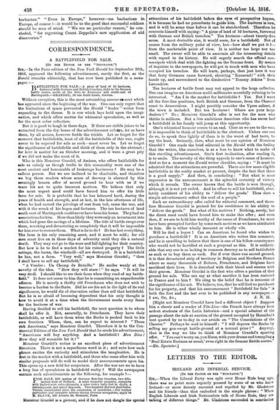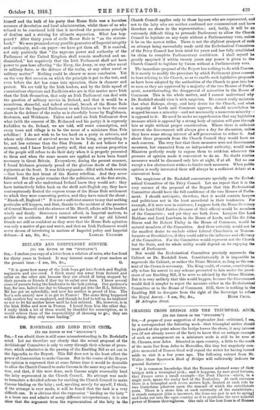LETTERS TO THE EDITOR.
IRELAND AND IMPERIAL SERVICE.
ere 1101 EDITOR OP THE " SPECTATOR."' Si:Ea—When the Liberal Party was split over Home Rule long ago, there was no point more urgently pressed by some of us who knew Ireland—or more fiercely resented and repelled by Mr. Gladstone and his friends—than that embodied in the simple phrase : "When English Liberals and Irish Nationalists talk of Home Rule, they are talking of different things." Mr. Gladstone succeeded ia convincing himself and the Milk of his party that Home Rule was a harmless measure of devolution and local administration, whilst those of us who refused to be convinced held that it involved the poisonous principle of dualism and a striving for ultimate separation. What has hap- pened? After thirty years of strife Home Rule is "on the statute. book." We were promised every possible guarantee of Imperial integrity and continuity, and—on paper—we have got them all. It is enacted, not only positively that "the supreme power and authority of the Parliament of the United Kingdom shall remain unaffected and un- diminished," but negatively that the Irish Parliament shall not have power to pass laws affecting "the Navy, the Army, or any other naval or military force, or the defence of the realm, or any other naval or military matter." Nothing could be clearer or more conclusive. Yet on the very first occasion on which the principle is put to the test, and even before the Act has come into operation, there is clamour and protest. We are told by the Irish leaders, and by the little squad of conscientious objectors and Pa.cificists who are in this matter more Irish than the Irish themselves, that only an Irish Parliament can deal with the question of military service in Ireland, and that it would be a monstrous, shameful, and indeed criminal, breach of the Home Rule compact for the Imperial Parliament to ask Irishmen to bear the same share in the defence of the realm as is cheerfully borne by Englishmen, Scotsmen, and Welshmen. 'Unless and until an Irish Parliament does what (with the consent of Mr. Redmond and his party) it is expressly forbidden to do, Ireland, we are told, will resist conscription, and every town and village is to be the scene of a miniature Shin Fein rebellion ! I do not wish to be too hard on a party in extremis, and whose only chance of survival seems to be in being, or pretending to be, not less extreme than the Sinn Feiners. I do not believe for a moment, and I know Ireland pretty well, that any serious proportion of the people will refuse to do their duty when it is properly presented to them and when the same means are applied as have been found necessary in Great Britain. Everywhere, during the present summer, I found Irishmen genuinely proud of the glorious deeds of the Irish regiments at the front. It was Irish regiments—filled with fresh recruits —that bore the first brunt of the Easter rebellion. And they never faltered. But the point remains that the politicians, at the first strain, have acted as all who understand Ireland knew they would act : they have instinctively fallen back on the shrill anti-English cry, they have contemptuously flouted the express terms of the Home Rule settlement to which they were consenting parties, and they have raised the shout : "Hands off, England ! " It is not a sufficient answer to say that nothing particular will happen, and that, thanks to the accident of the presence of General Maxwell and the absence of Mr. Birrell, affairs will be handled wisely and firmly. Statesmen cannot afford, in Imperial matters, to gamble on accidents. And I sometimes wonder if my old Liberal friends arc still as confident as they were that the Home Rule agitation was only a matter of gas and water, and that an Irish Parliament would never dream of interfering in matters of Imperial policy and Imperial



































 Previous page
Previous page